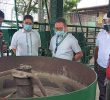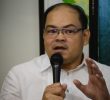by KRISTY ANNE C. TOPACIO-MANALAYSAY and JEREMAIAH M. OPINIANO
www.ofwjournalism.net
MANILA�PEOPLE who built their business from working abroad are moving to form a Chamber of Commerce to lure more overseas Filipino workers into becoming entrepreneurs.
�Instead of going to greedy local businessmen, fellow OFWs can go to themselves and make
arrangements to supply some raw materials, or even provide discounts to some of their products to fellow OFW entrepreneurs,� businessman Miguel Bolos told the OFW Journalism Consortium�.
Bolos spoke about the moves to form an organization after a meeting of former overseas Filipino workers-turned-entrepreneurs early March.
That meeting was attended by Filipinos who successfully built a business using what they earned and learned from working abroad.
There�s the garments export business couple Alberto and Liza Perez.
Alberto used to work as a steel fabricator in Saudi Arabia, Aruba and Malta before going into business with hundred thousand pesos (US$2,083.30 at current exchange rates) and 17 sewing machines as capital.
Before it was Perezes who went overseas; now it�s their Apryl and Aira�s Apparel brand, which they claim are bought by Wal-Mart in New York, United States.
There�s also former Saudi Arabia contract worker Eduardo Callera who owns Canor Express International Brokerage Inc., a customs brokerage firm.
Before, the boxes of products Callera sent home to his family in the Philippines were the ones transported in trucks. Now, Callera�s business �his trucks� moves these boxes to both domestic and international senders.
Bolos believes that an OFW chamber of commerce will enable fellow migrant entrepreneurs to talk among themselves and be suppliers of needed raw materials for their products.
It just might work because, as he said: �We need it.�
No OFW chamber of commerce based in the Philippines exists, although Bolos said he, fellow returning OFW Francisco Aguilar and fellow migrant workers in Saudi Arabia have tried �and currently moves to� forming such an organization.
Filipino immigrants in the United States have formed county-level and a US-wide chamber of commerce. The biggest of these chambers is the Federation of Philippine-American Chambers of Commerce (FPACC), a network of some 46 chapter chambers of commerce that have over-5,000 member-enterprises run by Filipino-Americans.
There is even no inventory of existing small, medium and large-scale enterprises run by former OFWs in the country that, Bolos thinks, can be linked together as members of a chamber of commerce.
Chambers of commerce are organizations that group businesses in town, though not usually associated with government, on a common interest. It could also include economic development groups, as well as tourism and visitors bureaus, according to a Wikipedia entry.
Pinoy Life Abroad









